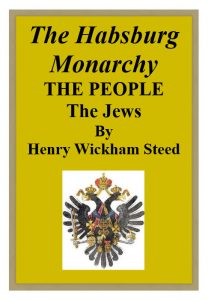AMONG THE PEOPLES OF AUSTRIA-HUNGARY the Jewish people stands first in importance. It is not usually enumerated among the Hapsburg “nationalities,” though the Zionist movement has brought into being a Jewish National Organization which was represented in the Parliament of 1907 by two Zionist deputies and by a politician who was described as a “Moderate Israelite.” In Statistical Year Books the Jews figure only as a “denomination.” Numerically they appear to be less considerable than the Germans, the Magyars, the Czechs, the Poles, the Ruthenes, the Serbo-Croatians, the Rumanes, and only surpass, with their official religious total of 2,300,000, the Slovenes and the Italians. Economically, politically and in point of general influence they are, however, the most significant element in the Monarchy.
No foreign observer of Austro-Hungarian affairs can close his eyes to the Jewish question, however much he may seek to ignore it or to “beg” it by adopting an unreasoning philo-semitic or anti-semitic attitude. The greatest obstacle to a comprehension of the terms of the problem is the difficulty of obtaining precise and reliable information. It is far easier to get at the truth of the Czech-German question in Bohemia, of the Slav-Italian question in Dalmatia and Istria, and even of the complicated struggle between Magyars and non-Magyars in Hungary, than to ascertain the merits of the Jewish question. Other ethnico-religious issues are local and special. They can usually be expressed in terms of language, creed, or of avowed political aspiration. The Jewish question is universal and elusive
